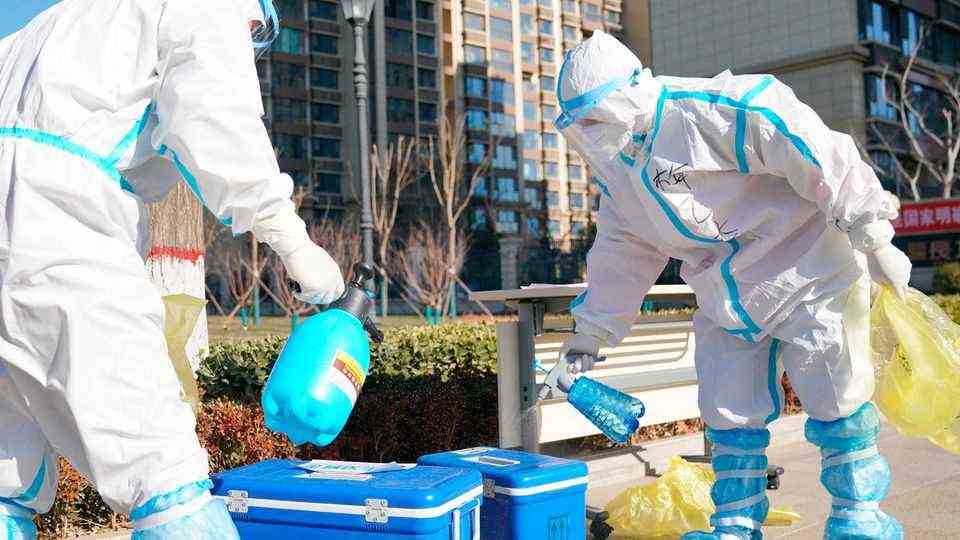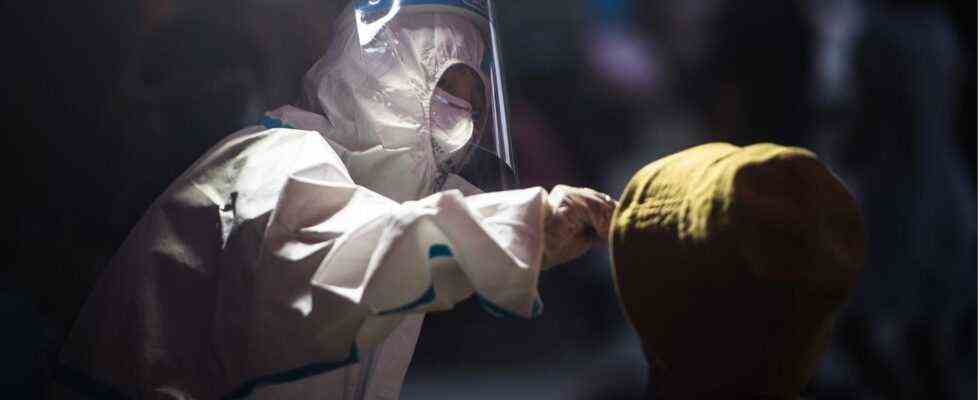Covid-19 pandemic
A new WHO group could be the last chance to find the origin of the coronavirus
The Chinese metropolis of Wuhan recorded the first known coronavirus outbreak at the end of 2019 / beginning of 2020. Smaller outbreaks have since been contained with measures such as extensive tests. The recording was made in August 2021.
© Xiao Yijiu // Picture Alliance
The World Health Organization is daring a new attempt: Once again, a group of experts is to investigate the origin of the coronavirus and advance future studies on pandemic pathogens. The Berlin virologist Christian Drosten is among the proposed experts.
It began with news about a “puzzling lung disease” that first spread in early 2020 in the Chinese metropolis of Wuhan. Soon afterwards, other countries reported the first cases of Sars-CoV-2 infections. The WHO finally declared Covid-19 a pandemic. Since then, more than 230 million people worldwide have contracted the coronavirus. At least 4.8 million people have died from the disease.
There are now effective and approved vaccines against Covid-19, and the treatment of patients has also made important progress – only the origin of the virus remains unclear. The World Health Organization (WHO) has once again put together a panel of international experts to investigate possible origins of the pandemic. The “Scientific Advisory Group on the Origins of Novel Pathogens”, or “SAGO” for short, is also to be commissioned to develop guidelines for future studies on the origins of pandemics and epidemics.
Provisional list published
The WHO published a provisional list of 26 scientists from numerous countries that are to become part of the “SAGO” advisory board in the future – including researchers from China, Russia, the USA, Saudi Arabia and Cambodia. The virologist Christian Drosten, director of the virology institute at the Berlin Charité, is also on the list. One of his main research areas is the area of emerging viruses, so-called “emerging viruses”. After a period of two weeks, the “SAGO” experts should be officially confirmed. More than 700 researchers applied for the work of the pandemic committee.
Among the proposals made by the WHO are eleven women and six researchers who were already part of a WHO expert panel that traveled to Wuhan, China, earlier this year to research the possible origin of the pandemic. At the time, the team of experts came to the conclusion that a natural origin of the virus was “likely to very likely”. Accordingly, Sars-CoV-2 is likely to originate from bats and could have reached humans via an intermediate host. However, the experts left open which species of animal could have served as an intermediate host. They stressed that further research was needed. The WHO expert panel had visited an animal market in Wuhan, from which the first known Sars-CoV-2 cases originated. Chinese colleagues were also involved in the investigation.
The group of experts at the time also referred to the theoryaccording to which the virus may have been released from a laboratory and described this possible cause of the pandemic as “very unlikely”. In a current “Science” editorial, which WHO Director General Tedros Adhanom Ghebreyesus wrote with two other WHO officials, states that a laboratory accident can only be ruled out “if there is sufficient evidence and these results are openly shared”.
China had repeatedly and sharply rejected this theory. Further on-site investigations should no longer be permitted. The US government accuses China of withholding information. According to Beijing, the US and other countries are abusing the pandemic for political attacks.
Politics hinders science
Michael Ryan, the executive director of the “WHO Health Emergencies Program”, described the work of the future panel of experts at a press conference as a “last chance to understand the origins of this virus in a collegial, collective and mutually responsible manner”. At the same time, he emphasized that it is not possible to ignore obstacles such as “national pride” in the search for the origin of the pathogen. The panel of experts is now an attempt to move more scientific questions into the focus of the efforts. In the current science editorial, too, “politicization” is named as the greatest obstacle to scientific processes.

The “SAGO” committee is to build on the work of the first WHO expert mission, sift through studies on the topic and inform the WHO about open questions and necessary further steps. “All hypotheses still need to be checked,” says the science editorial. A transparent scientific process is “essential”.
WHO also hopes that the work of the panel can facilitate future investigations and avoid political arguments. Covid-19 will not be the last “disease X”, write the WHO officials in “Science”. It is in everyone’s interest to be better prepared for the next novel disease.
Sources:Science / WHO / New York Times / DPA

